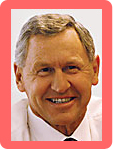David Morgan: In my view, the essence of great leadership has always been, and will always be, personal integrity - remaining true to your own values, your own beliefs and your own sense of right and wrong, however assailed you are by circumstance, failure or disappointment. For this reason, Nelson Mandela stands out for me as a great leader of our time. Despite his own incarceration for 28 long years, despite the apparent strength of a political system rooted in discrimination and injustice, Mandela never lost his belief in the essential decency of the human spirit. Our Community: What are the three attributes you would consider to be essential to a leader? And why? David Morgan: As I've said, the first would be personal integrity - being hard-wired to do the rightthing. All leaders are faced with challenges that simply can't be anticipated or foreseen. Effective leaders rely on an internal moral compass to instinctively guide themselves and their followers through often unchartered waters. Energy, drive and determination are other obvious attributes. The demands placed on leaders, intellectually, mentally, emotionally even physically, can be relentless. Dreaming, planning, strategising to use the modern jargon are all important but, in the end, leaders need the grit to push through and get the job done when others may falter. Finally, I'd choose good judgement - vital not only for day to day decision-making but to recognise talent within their teams, to look beyond the present and identify future opportunities that others may not see and to be realistic about what's achievable. Our Community: What are the barriers to new leaders emerging in Australia? David Morgan: Frankly, I'm a little uncomfortable talking about barriers. Australia really is a land of opportunity and no Australian, man, women or child, should ever feel they need to limit their aspirations. If pushed though, I remain concerned that the tall poppy syndrome still exists within our culture. Success should be celebrated and encouraged. Our Community: What advice would you give to a potential leader to take them to the next stage? David Morgan: The first would be to be extremely choosy about who they work for. Aspiring to be an effective leader is all about continuous challenge, continuous improvement and continuous honing of your skills. Working with great people and a great organisation will give you the right environment, the right encouragement and role models to undertake this journey. Secondly, do very hard jobs. Tasks that will stimulate and challenge you to be the best you can be. Finally, I recommend that potential leaders focus only on the job at hand. Do it well and the next opportunity will present itself soon enough. Ambition is a good thing but not if it distracts you from achieving your immediate goals. Our Community: Nature / nurture - are leaders born or bred? David Morgan: This is an age old and very complex debate. Some of both, I think - someone's essential personality can either limit or enhance their leadership potential. For the most part though, I would opt for 'nurture'. We are all remarkably adaptable beings and our experiences, especially in our early formative years, are crucial in developing our capacities. Our Community: What do you consider to be the top three leadership issues facing the nation? David Morgan: Given my background, I'm concerned that we are not attracting quality leaders into the public sector. Our entire system - the strength of the economy, the security of our citizens, our ability to apply resources to projects that transcend narrow or immediate self-interest - is dependent, in many ways, on the skill and commitment of people working within the public service. All of us will be the losers if we can't find a way to grow and retain talent in this area. More broadly, I think we should be vigilant about losing talent to other countries. I gained some fantastic experience and learning overseas so I am not for a moment suggesting we should try to limit these sort of opportunities. However, our home environment needs to remain an exciting and stimulating place where our best and brightest want to return to do great things. Finally, I would nominate 'short termism', both politically and within the business world, as a key leadership issue facing the nation. There are many, and some would say increasing, pressures on decision-makers to produce short term 'wins' to satisfy narrowly focussed interests. True leadership is often about resisting populist pressure and we all should understand that profiting today at the expense of tomorrow is a misguided and ultimately self-defeating strategy. Published November 2004 |

